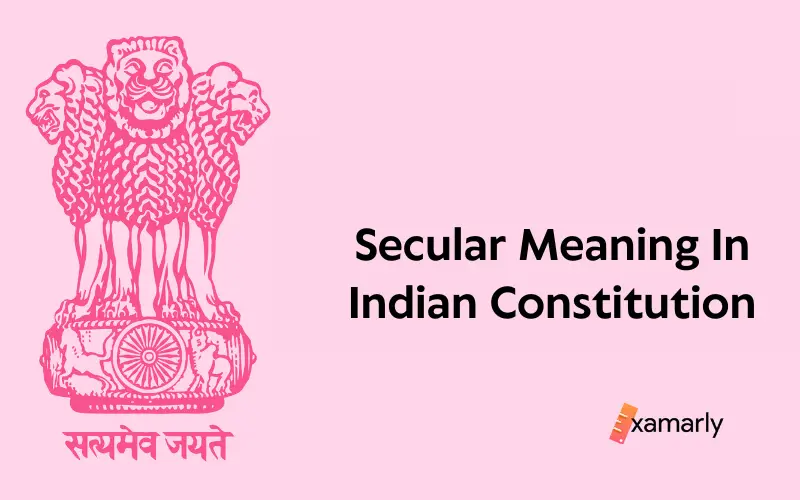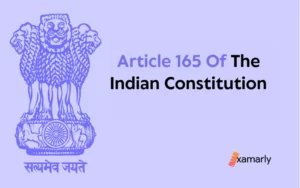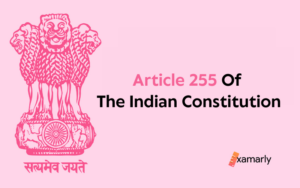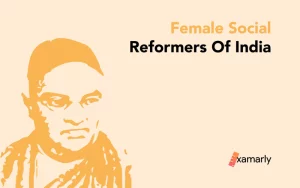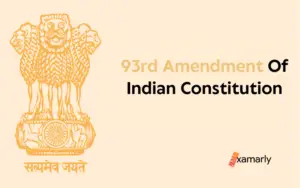You must have heard of the world Secular a lot of times. But what could have provoked the inception of this word, and how this word became an integral part of our constitution. Let us understand how this word came into being and what is the Secular Meaning In Indian Constitution.
- Secularism In India
- Secular Meaning in Indian Constitution – Constitutional Significance
- Difference Between Indian & Western Secularism:
- Secularism in India – History
- Secularism And The Indian Constitution
- Article 14 and Article 15
- Article 16 (1)
- Article 25
- Article 26
- Article 27
- Article 28
- Article 29 and Article 30
- Article 51A
- Secularism & Article 25 Of The Indian Constitution
- Indian Secularism – Philosophy
- Secularism – Facts for UPSC
- Secularism And Constitution Of India: Unity In Diversity
- Indian Model Of Secularism:
- Role of Indian Judiciary In Shaping The Secularism
- Summing Up
Secularism In India
- The term secularism refers to the exclusion of religion from public life and the state.
- Secular refers to being “apart” from religion or lacking a religious foundation. Everyone is free to practice their religion and is treated purely as a personal matter, and each person has the right to do so on their terms without receiving special treatment.
- The term “secularism” refers to a philosophy that promotes the separation of the state from religion and cultural aspects of life and supports allowing all religions the same status, respect, and financial support from the government.
Secular Meaning in Indian Constitution – Constitutional Significance
Secular Meaning in Indian Constitution is just not the definition of a word but a larger than life concept. The Preamble of the Indian Constitution declared that India is a “secular” nation with the 42nd Amendment of the Indian Constitution 1976. A secular state does not give the nation or its citizens’ special consideration in favor of any one religion. Institutions began to appreciate pluralism, accept and acknowledge all religions, and enact legislative laws rather than religious ones.
Difference Between Indian & Western Secularism:
- In Western dictionaries, secularism is defined as the separation of religion, however, in India, secularism does not imply irreligion. It refers to the abundance of religion.
- Indian secularism shares some characteristics with western secularism, yet there are also significant variances, some of which are discussed below-
| Indian Secularism | Western Secularism |
| The basic principles of secularism in Indian society signify the equal consideration of all religions and the absence of prejudice against other religions’ adherents. | The meaning of secularism in western culture refers to separating religion from the government and universal religious freedom. |
| In the Indian concept, secularism takes the form of a society where all religions are represented, and adherents can freely practice their faith. | The Western idea of secularism opposes the open expression basis of religion rather than worship places. Religion is completely consigned to the private domain and has no place at all in public life. |
| In the Indian concept, the law aims to be sensitive to the various scriptural beliefs that adherents of various religions consider important. | The western concept makes laws independently of religious considerations. |
| All religious sects and minorities in India have the legal right to establish and operate their educational institutions, which may also be eligible for governmental funding. | According to the western concept, religious communities’ educational institutions cannot get any financial assistance from the state. |
| In the Indian concept of secularism, the government can intervene in religion to purge its social evils. | Unless there are substantial and pervasive legal infractions, the Administration does not become involved in religious concerns. |
| The idea of secularism in India asserts that minorities should also have the freedom to practice their religion. It supports the community’s survival and the preservation of the heritage and education systems of religious minorities while enabling each individual to freely practice their faith. | The equality emphasizing other religious minorities is typically disregarded in favor of emphasizing the freedom and equality of followers of a single religion. |
Secularism in India – History
India’s secular traditions are immensely prevalent throughout its heritage. There is no recognized state religion in India; instead, Indian culture is based on blending many different religious cultures and social movements. Let’s briefly discuss secularism in India’s history:
In Ancient India
- The Santana Dharma (Hinduism) was essentially permitted to evolve as a complete religion by inviting other spiritual traditions and striving to combine them into a single mainstream.
- Around 2200 years ago, Ashoka and 1400 years ago, Harsha, both welcomed and supported diverse religions.
- No matter what religion they practiced, including Hindutva, Buddha, Jain, or any other, everyone in ancient India was granted citizenship and enjoyed religious freedom.
- This perspective on religious relations changed when Islam came to India and the Delhi Sultanate was created in North India by the 12th century, followed by the Deccan Sultanate in Central India.
- The theological and political tenets of Islam were in opposition to those of Hindu religion, Catholicism, and other Indian religions.
In Medieval India
- The Sufi and Bhakti movements created a loving and peaceful connection between members of various communities. Khwaja Moinuddin Chisti, Baba Farid, Sant Kabir Das, Guru Nanak Dev, Saint Tukaram, Mira Bai, and many others, were the movement’s major luminaries.
- After Aurangzeb, India took over the British Raj and the East India Company.
Instead of separating religion and state, colonial authorities ended Islam and Hinduism on the same footing in importance and reinstated the idea that Hindus, Christians, and Muslims are all equal before the law.
In Modern India
- The majority of those involved in creating modern India, who were heavily influenced by European ideas and practices, were also passionate secularists.
- Jawaharlal Nehru, the nation’s first prime minister, was foremost among them. He saw a secular state as an essential component of modernity.
- The liberals who participated in the early stages of the Indian freedom movement, such as Sir Feroz Shah Mehta, Govind Ranade, and Gopal Krishna Gokhale, largely adopted a secular political philosophy.
- While according to J. L. Nehru’s secularism was a dedication to scientific humanism tinted with a progressive perspective of historical development, Gandhiji’s secularism was based on his dedication to the fraternity of religious groups and their respect for the search for the truth.
Secularism And The Indian Constitution
The word “secular” is added to the Indian Constitution by the 42nd amendment, which became operative in 1976. When the word “secular” was introduced to the preamble, secularism was included as part of the fundamental structure of the constitution. This effectively means that because it is a fundamental component, the secular portion of the Indian constitution cannot be changed by any legislation.
The constitution views secularism as a positive philosophy that can lead to treating all religions equally rather than as a complete separation of state and religion. Furthermore, the state’s involvement in matters of faith is restricted to situations in which the court determines that a productive modification of the preexisting religious standards is necessary.
After the word “secular” was included in the constitution following provisions were made in the articles of the Indian Constitution:
Article 14 and Article 15
While the latter broadens the definition of secularism to encompass all conceivable grounds by forbidding discrimination based on religion, ethnicity, class, gender, or place of birth, the former ensures that everyone has equal access to justice and equality under the law.
Article 16 (1)
affirms that everyone has equal access to public job opportunities and forbids discrimination based on faith, ethnicity, class, gender, ancestry, place of birth, and domicile.
Article 25
All people have an equal right to freely proclaim, practice, and spread their religion, which is known as “freedom of conscience.”
Article 26
Every group of religion or individual has the liberty to create and maintain institutions of religion and charity as well as to conduct its affairs in religious concerns.
Article 27
No citizen may be required to pay taxes by the state to support or maintain a certain religion or religious institution.
Article 28
facilitates the teaching of religion at universities of higher education run by numerous religious groups.
Article 29 and Article 30
Ensures that minorities have rights to rights of culture and education.
Article 51A
obliges all people to foster peace and a sense of the rich cultural history of our diverse community should be treasured and protected, as well as a sense of fraternity.
Secularism & Article 25 Of The Indian Constitution
Religious liberty is one of the six fundamental rights that the Indian Constitution provides to its people. The Indian Constitution’s Article 25 grants each citizen:
- Freedom of Conscience, that is, all people have an equal right to religious freedom,
- including the freedom to confess,
- practice and spread their faith.
Article 25 addresses both religious practices (rituals) and religious beliefs (doctrines). Furthermore, both citizens and non-citizens are entitled to these rights. However, there are justifiable limitations on individuals’ fundamental rights, and the federal or state governments have the authority to meddle in citizens’ religious affairs when necessary.
Related – Secularism
Indian Secularism – Philosophy
- The term “secularism” is similar to the Vedic idea of “Dharma nirapekshata,” or the state’s indifference to religion.
- Western democracies, where the government is completely distinct from religion, have adopted this concept of secularism (i.e., Church and state are kept apart).
- The “Sarva Dharma Sambhava” (meaning, “that the endpoint of the pathways pursued by all faiths is the same, although the paths themselves may be different”) is an Indian secularism philosophy that refers to the equal respect of all religions.
- It is known as “Positive Secularism” because it reflects the main philosophy of Indian culture. Positive Secularism was embraced and supported by individuals like Vivekananda and Mahatma Gandhi.
- There is no recognized Indian official religion. However, a person’s religion may have various personal rules depending on issues like marriage, divorce, inheritance, and alimony.
- The goal of Indian secularism was not to end in itself but to achieve the peaceful coexistence of all religions.
- Currently, in the Indian context, secularist philosophy’s core principle is the separation of religion and state.
Secularism – Facts for UPSC
A few significant Secularism-related facts are mentioned in the list below for the UPSC 2022 exam.
- The forty-second Amendment Act inserted the word “Secular” into the Preamble of the Indian Constitution.
- India’s fundamental rights support the nation’s secular structure.
- The Indian Constitution’s secular character is a fundamental aspect of it and cannot be changed by any act.
- The Supreme Court upheld the legality of “Secularism” as a core principle of the Constitution in the Bommai Case of 1994.
- Two ideas are sometimes used to explain secularism: Positive & Negative
- Western secularism is seen as the adversary of secularism from India. It implies a complete decoupling of the state from religion.
- In India, where there are many different religions, this destructive secularism as a notion has no bearing.
- Positive concept of India exhibits secularism. The Indian Constitution constructively represents secularism, preserving all religions equally and providing them equal respect.
- Since secularism is an essential component of India’s culture, any state government engaging in anti-secular politics is subject to punishment under Article 356.
Secularism And Constitution Of India: Unity In Diversity
The four great world religions of Hinduism, Jainism, Buddhism, and Sikhism all originated in India. However, India is one of the most religiously diverse countries. India’s national values have always been fundamental unity, tolerance, and even religious synthesis. Unquestionably, hundreds of millions of Indians from different religious backgrounds lived alongside peacefully throughout history.
The Indian Constitution’s Preamble strives to establish India as a sovereign, socialist, and democratic republic. The 42nd amendment added the words socialist and secular to it. The preamble contains a summary of the entire constitution. It is a reflection of the Constitution’s spirit. Indian society is a multireligious society with a variety of different faiths and religious diversification. Therefore, each of these is a component that divides in some way and, if not managed correctly, poses a risk to the unity and integrity of the country.
The constituent assembly had a clear understanding of the country’s unique circumstances, and by carefully crafting the preamble, it aimed to guarantee citizens justice, equality, and liberty. The fundamental goal is to uphold national integrity, national unity, and individual dignity while promoting brotherhood.
Thus, the state is required under the constitution to combat the circumstances that limit religious fraternity. Additionally, the state must act both positively and negatively to advance brotherhood.
Indian Model Of Secularism:
- It includes both the freedom for people to publicly express their religious ideas and the freedom for religious communities to form and sustain religious schools.
- The third characteristic of Indian secularism is that it is equally concerned with inter-religious dominance as intra-religious domination is present. This is because it was created in an incredibly multireligious society.
- It doesn’t build a barrier between the affairs of the state and religion. This gives the state the ability to influence faiths, helping or hindering them without feeling the need to control or obliterate them.
- It is not wholly opposed to the nature of religion in society. Even though the state is not formally identified with any one religion, religious communities are given governmental status and public acknowledgment.
- Secularism unquestionably strives to provide every citizen with the blessings of the rights to liberty and happiness, but to achieve this goal, secularists must be motivated by an ethical sense of duty in how they interact with other people.
You Might Also Like – Justice Meaning In Indian Constitution
Role of Indian Judiciary In Shaping The Secularism
The term secular is dynamic rather than static. There can never be a single, unchanging perspective on this idea. The Court occasionally defines secularism differently and puts it into practice.
- The Supreme Court of India declared that “Articles 25 and 26 help to stress the secular aspect of the Indian democracy, which the founding fathers deemed to be the basic foundation of the Constitution” in Sardar Taheruddin Syedna Sahib v. State of Bombay (AIR 1962 SC 853).
- The Supreme Court of India ruled in Kesavananda Bharati v. the State of Kerala (AIR 1973 SC1461) that the Constitution’s fundamental design is one of secularism. According to Chief Justice Sikri, the Constitution’s foundation is its secular nature. The secular and federal characteristics of the Constitution, according to justices Shelatand and Grover, are the fundamental components of its basic framework.
- Justice Jaganmohan Reddy said that freedom of thought, expression, worship, faith, and religion could not be altered under any circumstances as they are fundamental elements of the Constitution.
- Similarly to this, the Hon’ble Supreme court of India clarified in the case of Bommai v. Union of India, what secularism means. (1994), 3SCC 1. According to the Court, secularism entails treating each religion equally. The Supreme Court determined that the word “secular,” which the 42nd Amendment introduced in the Preamble of the Constitution, underscores the fundamental rights protected by Articles 25 through 28.
- The use of religion for political ends and the utilization of religion by any political party to achieve political goals would violate the State’s neutrality, according to the Supreme Court of India. Religion and politics shouldn’t exist side by side.
- In the matter of Abhiram Singh v. C D Commachem, the Supreme Court of India was consulted. (2017)10 SCC 1 if secularism entails the total separation of religion and politics.
The Supreme Court of India decided that secularism does not mandate that the State should be indifferent to religion, but rather that it ought to be impartial toward all religions. It is impossible to entirely separate politics from religion and caste since they are fundamental components of our society.
Summing Up
The Constitution’s basic structure of secularism, according to the Supreme Court of India, cannot be changed. All religions are treated equally under secularism which derives from the cultural value of tolerance. Since the Indian government is not associated with any religion, no faith will be in danger. The Supreme Court of India further declared that secularism and democracy are fundamentally related. and that a secular state is necessary for democracy to function properly and for marginalized groups to benefit from it.


